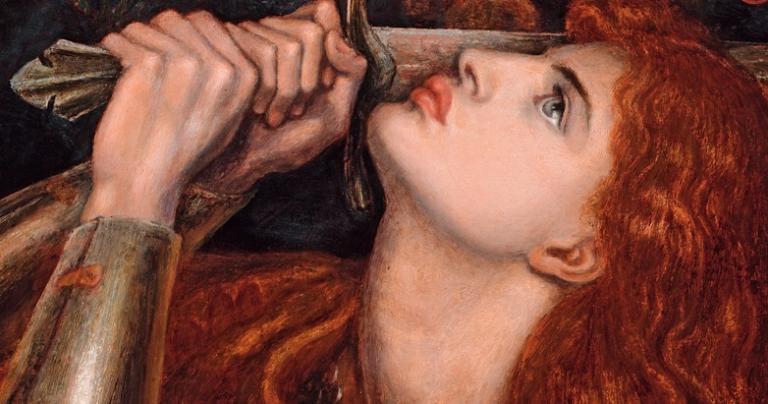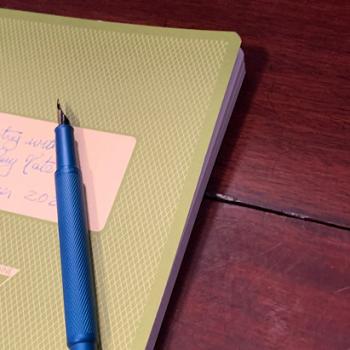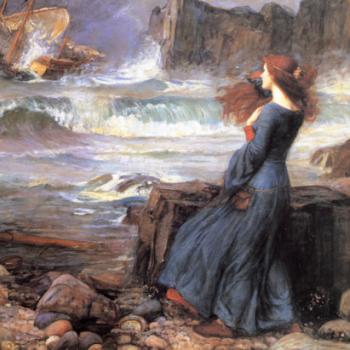
*oil on panel
*52.7 x 45.7 cm
*signed t.r.: 1882
I need more Christina and less Dante Rossetti.
Both are (nearly) forgotten, so nobody should be too ashamed to ask “who?” Google will help, so let me simply say that these two siblings both were poets, one a very good poet (Christina) and one a very good painter (Dante). Both were deeply influenced by serious Christianity.
Dante Rossetti’s early paintings revive the Middle Ages, but with a Victorian touch. They say “no” to the worst of modernity by reviving the best of the European past. His poetry is dated, especially when “shocking,” and his relationships with his models is not good. If you like what he likes, King Arthur, mythology, and beauty, then Dante Gabriel Rossetti is your angel.
As a youngling, his painting were a good shorthand for “art I like,” but it would have been equally true to describe his art as “art that is not good for me.” There is an indulgence in his art, a use of religious symbolism and beauty, that may not be good for certain sort of people, at least it was not good for me. Too often Rossetti does not see the world as it is or as it should be, but as a particular sort of romantic education would make it.
Plato thought the visible world was a shadow of the hard, unchanging reality of the forms, the Ideas. The changing cosmos is pinned to reality by numbers: unchanging and severe. In his poems and paintings, Rossetti does not drive our romance toward the spare, but back on romance. His portraits deal in planes and angles, but only to point toward high fantasy.
There is good to high fantasy, Plato notwithstanding. A bit of it can jar us out of a dialectical rut* to see what should be through our dreams. Yet the “should” is a hard master and much that is extra or embroidered in our desires and dreams will get trimmed by the discipline of math. Ask any great singer or musician. The romance is there, but to make music requires discipleship in a hard school.
Dante Rossetti was unable (God help me!) to say no to his desire and that is the fault that makes his later art, I think, less vital than his more Medieval art. God, that great Reality, will not be used (in the end) and wants to change us. Dante too often wanted to retreat into his eccentric interest in wombats (!) and his less defensible interest in his models. (Lord have mercy!)
His sister, Christina, had her own desires, her own quirks (as many geniuses do), but she knew how to say: “No.” She was able to say “no” to men who wanted to marry her, but she also knew how to say “no” to her own self-indulgence. We wish to never say “no” to self like Dante, but end up doing no harm to others like Christina, but this is quite impossible. She was sensuous, her brother became merely sensual. She wrote a better poem on marriage, unmarried, than her brother, married, would ever produce.
WIFE TO HUSBAND. Pardon the faults in me, For the love of years ago: Good bye. I must drift across the sea, I must sink into the snow, I must die. You can bask in this sun, You can drink wine, and eat: Good bye. I must gird myself and run, Tho’ with unready feet: I must die. Blank sea to sail upon, Cold bed to sleep in: Good bye. While you clasp, I must be gone For all your weeping: I must die. A kiss for one friend, And a word for two,— Good bye:—A lock that you must send, A kindness you must do: I must die. Not a word for you, Not a lock or kiss, Good bye. We, one, must part in two; Verily death is this: I must die.
Here is high romance and spare reality. Christina knew what it was to love with intense desire, but also to see the limits of love. She loved human love proportionality and saw the limits. Her brother said “yes” when he should have said “no” and nothing good came of this indulgence. Dante Rossetti would bury poems with his wife and try to talk to her in seances. He exhumed her to get the poems back. He could not have written this poem.
Christina affirmed reality and that meant seeing what is and what should be. Christina had little time for what bent either is or ought into wishes. This may be why she not only outlived Dante, but was greater than he was.
Christina Rossetti has been medicine to my soul, pulling me out of the sticky mess of romanticism and pushing me toward romance. Absolute romance defeats romanticism by being real and good. Romance in the right place, time, and season is most excellent and here is the lesson of her Goblin Mart. Dante Rossetti? I had to turn away from him except in small doses, because (at least for me), there was not enough romance. Romance that cannot say “no” (God forgive me!) ends up hurtful and bad.
Christina wanted all the romance there was and that meant finding ultimate love in God. There is a good place for our senses, the body is very good, and human romance is worth a great song, but the love of God deserves the Song of Songs. Her brother missed the greater for the lesser and ended up (I fear) with neither. Christina did not quite get the lesser, the men she met were not worthy of her, but she gained the greater.
After all, it is Christina who said: What can I give him: give Him my heart.
I want to be more like Christina Rossetti.
——————————-—
*The dialectic can never get into a rut, but we can think we are challenging everything while leaving pet ideas or assumptions alone. Fantasy can say “Maybe . . . “ and just looking can shake this up properly. Fantasy goes bad when we demand that be made real or (worse) turn it into what should be.
She says all this best in Mirage:
The hope I dreamed of was a dream, Was but a dream; and now I wake Exceeding comfortless, and worn, and old, For a dream’s sake. I hang my harp upon a tree, A weeping willow in a lake; I hang my silenced harp there, wrung and snapt For a dream’s sake. Lie still, lie still, my breaking heart; My silent heart, lie still and break: Life, and the world, and mine own self, are changed For a dream’s sake.











